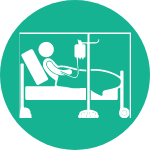Comprehensive Molecular Diagnostic Tests
We are offering RT-PCR tests for the detection and/or quantitation of a wide range of bacteria, viruses, and gene mutations. All the tests are highly automated resulting in reduced turn-around time for reports.

Our extensive research ensures a high degree of standardisation of specific factors while working with clinical samples. On the basis of internal studies, we have also optimised our assays and kits before systemising the test across laboratories. Standardization of result interpretation ensures sensitivity precision, reproducible, reliable, and accurate diagnostics.
Therapy Areas
RT-PCR technology represents a powerful tool in microbial diagnostics. In viral and parasitical detection, quantification and typing, the suitability of this technique is considered as gold standard in the area of bacterial diagnostics it can replace culture techniques, especially when rapid and sensitive diagnostic assays are required.

Infectious Diseases
Our studies reveal functional methods for quantification of viruses and bacteria, fungi, parasites and protozoans as well. The majority of the assays and kits allow an increased sensitivity and enhanced speed of microbial detection as compared to the classically used culture techniques. Moreover, the assay makes an accurate quantification of pathogen load.
Advantages of using Rivaara’s MDx solutions in various diseases are:
- Substantial reduction of redundant antibiotic prescriptions seems possible because of appropriate diagnostics particularly in respiratory tract infections.
- Quick results within hours ensures immediate clinical action.
- Highly sensitive and specific test.
- Reduced likelihood of a false positive or false negative result.
- Viral multiplex solutions for all ages.

Genetic Disorder
Genetic disorders diagnosis require the highest standards in laboratory practice to ensure an accurate result. Emerging protocols of “non-invasive” prenatal diagnosis, which are based on analysis of free fetal DNA in the circulation of the pregnant mother, also have to achieve a result from a limited quantity of fetal DNA.
Real-time PCR offers more rapid and potentially higher throughput assays, without compromising accuracy and a wide dynamic range of detection with a high degree of sensitivity. Monogenic diseases, prenatal diagnosis, non-invasive prenatal diagnosis and preimplantation genetic diagnosis can be diagnosed with better precision and sensitivity.

Sexually transmitted disease
Sexually transmitted diseases (STD) are a major cause of infertility, long-term disability, ectopic pregnancy, and premature birth. They increase the risk of developing genital cancers, and are a severe medical, social, and economic burden to thousands of adults and babies worldwide. To date, more than 30 pathogens such as bacteria, viruses, and parasites have been shown to be transmitted through sexual contact. Chlamydia trachomatis, Neisseria gonorrhoeae, Mycoplasma genitalium, Trichomonas vaginalis, Mycoplasma hominis, Ureaplasma urealyticum, Ureaplasma parvum, herpes simplex virus (HSV) are reportedly the most prevalent STD pathogens. Novel multiplex RT-PCR test for STD is the molecular diagnostics tool with better sensitivity, specificity and reproducibility.

Hospital Infections
Increasingly, hospital-acquired infections with multidrug-resistant pathogens represent a major problem in patients. Understanding pathogen relatedness is essential for determining the epidemiology of nosocomial infections and aiding in the design of rational pathogen control methods. The role of pathogen typing is to determine whether epidemiologically related isolates are also genetically related. To determine molecular relatedness of isolates for epidemiologic investigation, new technologies based on DNA, or molecular analysis, are methods of choice. The integration of molecular typing with conventional hospital epidemiologic surveillance has been proven to be cost-effective due to the associated reduction in the number of nosocomial infections.

Oncology
Molecular Diagnostic based on RT-PCR can be used to provide accurate prognosis and to predict response, resistance, and toxicity to cancer therapy.
We endeavour to optimise RT-PCR techniques for the detection of minimal residual disease(MDR), single nucleotide polymorphisms and chromosomal translocations. In numerous haematological malignancies the detection of MRD directly correlates with the clinical outcome of the disease. Proving that MRD monitoring is important for therapy guidance in clinical settings. RT-PCR based techniques are used in clinical protocols for the detection of MRD.
Our in-house research team endeavours for the integration of molecular markers into existing histomorphologic classifications in surgical pathology to provide additional stratification for a more accurate prognosis. Believing that recent advances in molecular definition of cancer may allow them to develop new kits for the guidance of therapy and the ability to monitor residual disease.

Gastro
Gastrointestinal infections in both pediatric and adult patients account for significant morbidity and mortality worldwide. In addition, immunocompromised hosts, including HIV patients, solid-organ transplant recipients or patients requiring therapy for chronic inflammatory diseases are susceptible to gastrointestinal infections. This can be caused by a number of pathogens including viruses, bacteria, and parasites. Presentations of gastroenteritis with an unidentified source pose a challenge to health care providers, as the same clinical presentation can be caused by different etiologies. Conventional detection methods e.g. electron microscopy and immunoassays apparently lack sufficient sensitivity. RT-PCR helps to diagnose this with higher sensitivity and specificity.

Neurology
The molecular diagnosis of a wide range of different neurological syndromes was established by a reverse transcription multiplex PCR assay. The applications of RT multiplex PCR assay are extensive and prove to be particularly valuable for the rapid and sensitive diagnosis of neurological diseases in both immunocompetent and immunocompromised patients.


